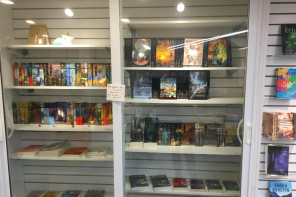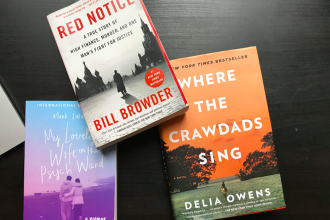In my third year of university, I confronted an oddity of a fact: there have existed more than a handful of worthwhile Canadian authors. You don’t say? Right, but hear me out. My entire schooling has taken place in Montreal, and in the seven years of high school and Cégep, I have read a total of three English-language Canadian novels. They were Lawrence Hill’s Book of Negroes (2007), Margaret Atwood’s Alias Grace (1996), and Heather O’Neill’s Lullabies for Little Criminals (2006). Until taking a Canadian Literature class this semester, I assumed the only authors worth considering were the three mentioned above joined by Alice Munro, Michael Ondaatje, Leonard Cohen, and Mordecai Richler. In truth, they were the only Canadian authors I could name. Oh, and Lucy Maud Montgomery, of course. (Shame on me for forgetting her.)
It was a different story in my French-language Canadian literature classes. There, we read the works of early writers like Louis Hémon; we read some pivotal mid-century works by Michel Tremblay, Gabrielle Roy, and Anne Hébert; and we enjoyed contemporary authors such as Dany Laferrière, Eric Dupont, Kim Thúy, Wajdi Mouawad, and Sergio Kokis. We discussed each in their context and wondered what they had done to help shape a national consciousness in Quebec; how they had respected or deviated from the norm; what points of view they wrote from and what identity they forged through their creations. In short, we did what we didn’t do in our English classes: we looked at a Canadian canon and how it evolved.
My experience is not unique: Canadian schools have long struggled with making Canadian literature a priority. The alarm was wrung in the 60s and the government responded with some effort. As critic Michael Lapointe points out however, a 2002 Canada Council for the Arts report revealed the problem persisted: “[few] students could identify ten Canadian writers, and most read no more than five Canadian books during their secondary education.” Lack of funding for Canadian books, lack of interest, and lack of worthwhile Canadian literature (really?) are reasons put forward to explain why Canadian students are reading primarily American and British literature.
My experience is not unique: Canadian schools have long struggled with making Canadian literature a priority.
So why does this matter? Is the alarm merely an indication of outdated nationalist sentiment? Are we the little dog who yaps pathetically away as we try to protect our territory (yet again) from the States? Or is it more than that? I think there’s good reason for studying our own literature, and that any curriculum must start by looking at early works: it helps to know the shape and reach of the roots before analyzing the tips of the branches. This is something my French teachers understood. Every generation of writers is conscious of the one that precedes it and intentionally imitates or departs from what was done. To profitably explore this, we need a knowledge of the canon. Yes, you could argue that such texts are mostly White stories that may leave out or unjustly represent minority groups, particularly Indigenous peoples. Much of the time, you would be right. Yet even this fact is a necessary one in understanding our situation – both literary and social – today. Another fact remains: there is some good literature written during this time in Canada. I can think of no reason to suffer through casual racism in the great works of Fitzgerald and Steinbeck, while dismissing the works of Morley Callaghan and Ethel Wilson on that very pretense.
Speaking of racism, its history — institutional or otherwise — is not the same in Canada as it is in the States. Literature can be a valuable tool in discussing this multi-faceted and important problem, but why do we continue to use American examples for this purpose? In an article for The Globe and Mail, Kate Taylor makes this point. She questions the validity of teaching To Kill a Mockingbird when Canadian alternatives, such as Earth and High Heaven and Obasan, are available and would encourage more pertinent discussion.
The inclusion of work by Indigenous authors has pure literary value, but it also prompts queries into the shortcomings of the traditional canon…
As well, a greater focus on Canadian Literature must necessarily highlight Indigenous literature. The inclusion of work by Indigenous authors has pure literary value, but it also prompts queries into the shortcomings of the traditional canon and allows for insight into its future. Indeed, Rachel McCrum, from the Quebec Writers’ Federation (QWF), referenced the multiplicity of Indigenous voices when we sat down to discuss the current literary climate in Canada. This increased presence permits rewarding discussion among writers in the process of creating their own canon. McCrum spoke of authors like Eden Robinson (author of the Son of a Trickster trilogy) who are conscious that they now have three generations of Indigenous writers with whom to engage in dialogue.
If it is the schools’ responsibility to teach where Canadian literature has been, the QWF has taken up the role of fostering current writers who hope to shape the future, at least in Quebec. A charitable organization that promotes and supports English-language writers in the province, the QWF holds writing workshops, arranges mentorship programs, and hosts literary prizes, including the QWF Literary Prize for Young Writers, alongside other initiatives. Curious about the consciousness of writers today, I asked Ms. McCrum and her colleague, Anna Leventhal, whether they noticed any orientation towards the regional or an engagement with national or local sentiment in the prose and verse submitted to the QWF. This did not seem a trend. Rather, they commonly saw writers from all different backgrounds, including second-generation Canadians and native French speakers writing in English, exploring the birth and creation of identity through their craft.
A part of the QWF’s unofficial mission is to encourage writers to think of Canada as a fruitful place for a literary career. As McCrum pointed out, New York and London, however glamorous, do not hold the monopoly on creative success. It is a commendable endeavour, and one that would certainly be helped if our schools’ curricula were not structured so as to insinuate Canadian literature has little to offer.




